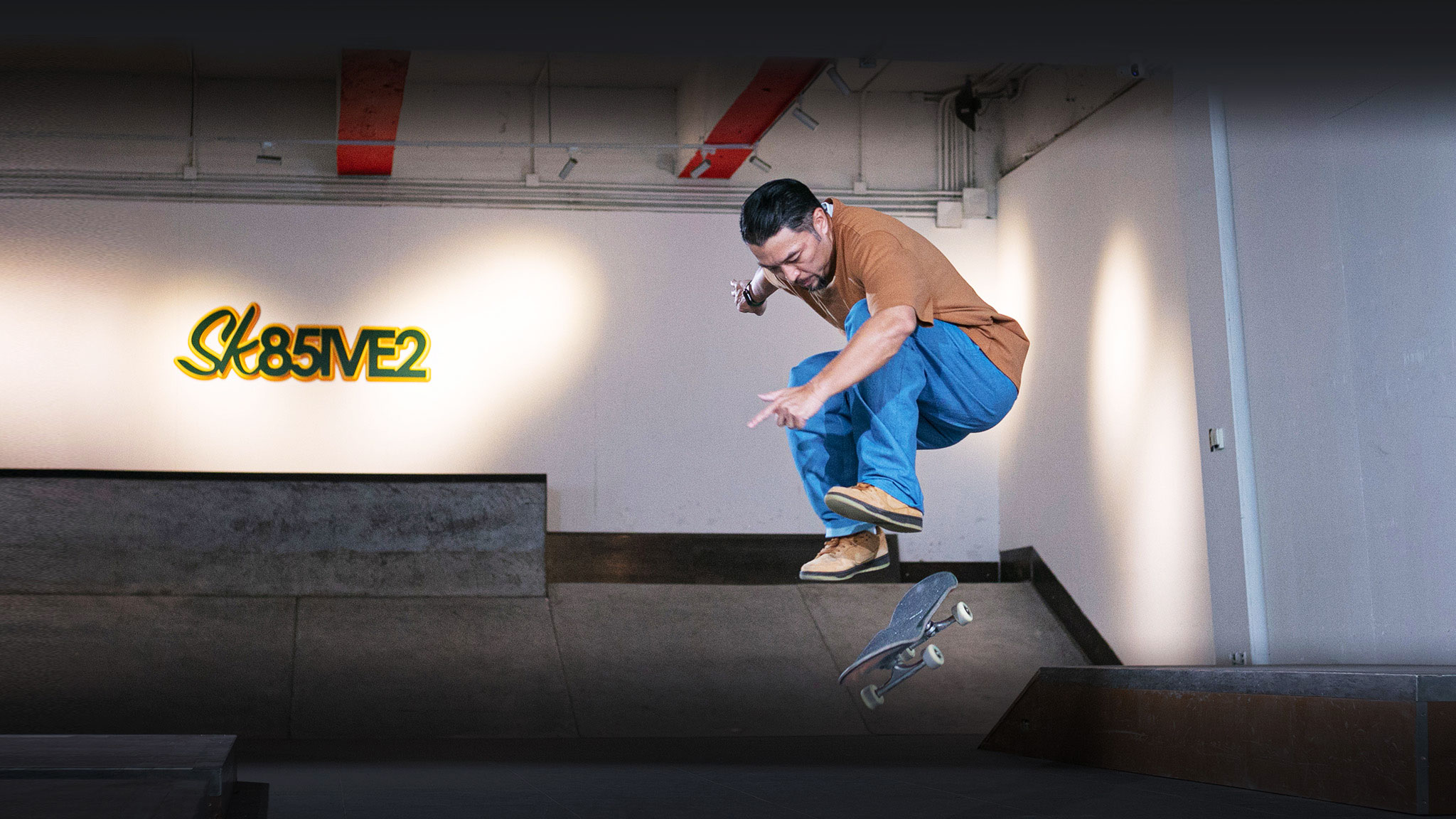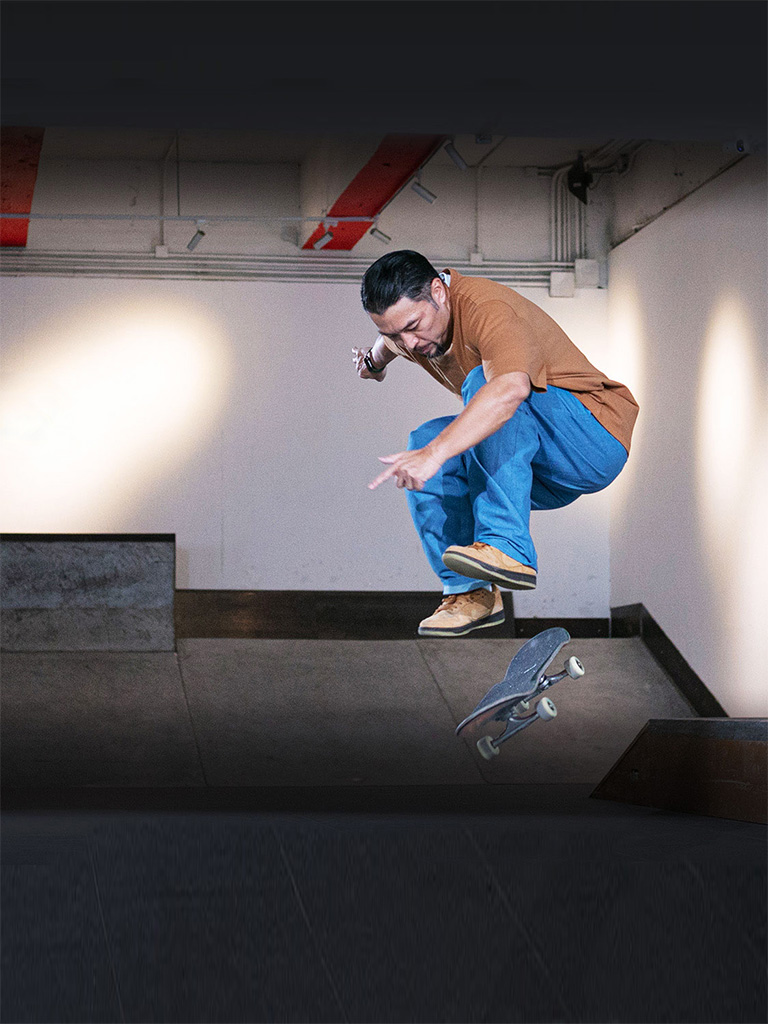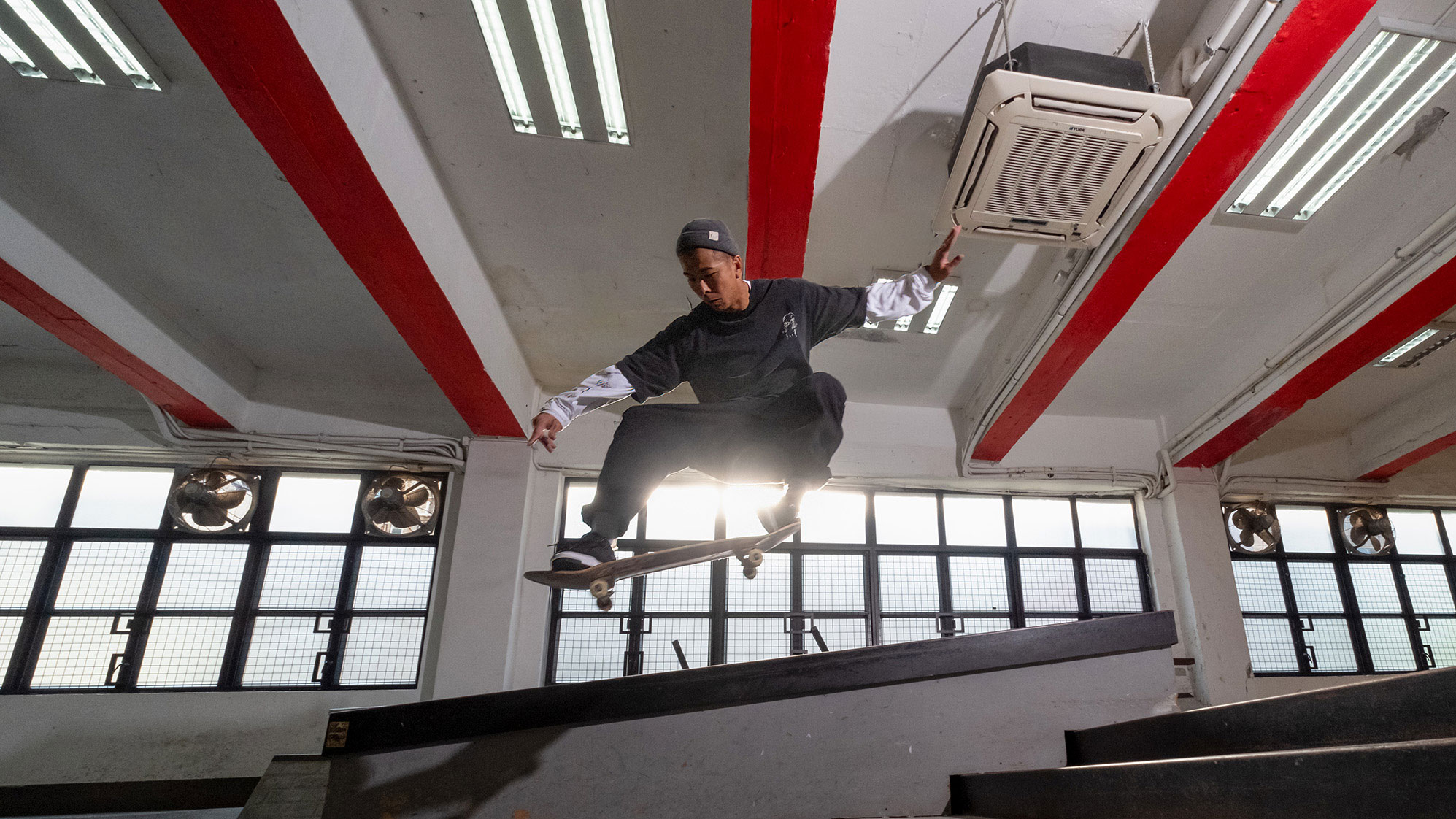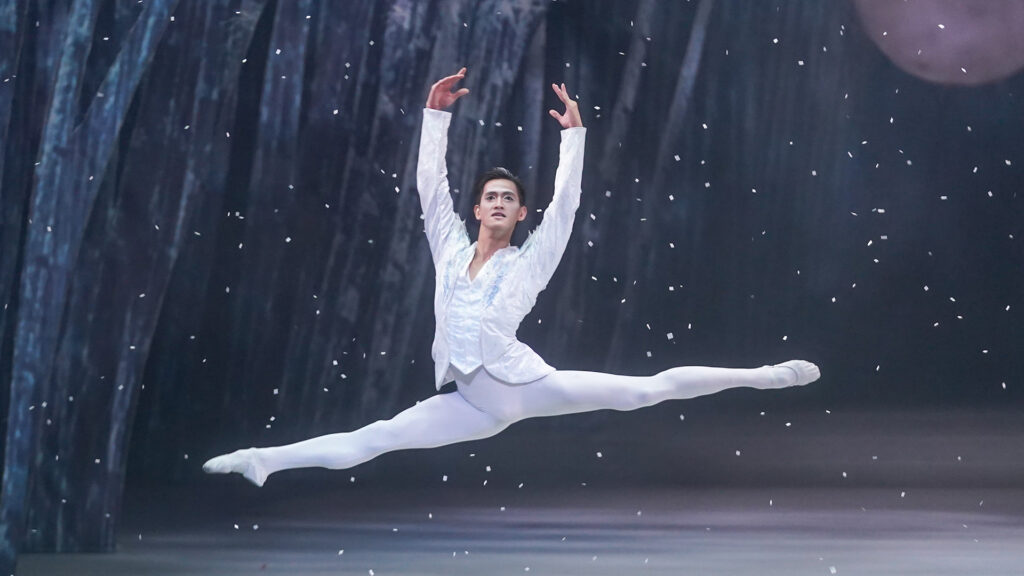

All Hands on Deck
The co-founders of All Hong Kong Skateboards Association discuss bringing the urban sport to the mainstream and the valuable lessons of never standing still, both on the streets
It’s Friday evening in Wan Chai. The rhythmic clatter of wheels on the pavement echoes as a skateboarder gains momentum in the shadow of Immigration Tower. With a burst of energy, he launches into the air, kickflipping his board before he finds his feet again on the other side of the bench. The wheels hit the ground, and the skater rolls away to the raucous hollering of fellow skateboarders.
Today, skateboarding is prohibited in the once iconic skate spot on Hong Kong Island, but scenes like this were typical in the 1980s when skateboarders like Julius Brian Siswojo would gather every week to make creative use of the plaza’s rails and benches. “There’s no discrimination, no boundaries,” says Siswojo. “If you skate, we’re down.” In addition to being inclusive, he points out the camaraderie, saying: “It’s only in skateboarding that even if one skater loses in a competition, they are still stoked when their competitors land a trick.”

Bound by a shared love of skateboarding, Siswojo joined forces with fellow skater Chung Pak Khei and a group of friends to register the All Hong Kong Skateboards Association (AHKSA) in 1999 to provide a platform for skateboarding community events, as well as workshops, lessons, and camps for children.
Co-founder Chung notes that urban sport’s strength is its can-do mindset. “We skate, we fall, and we get right back up,” says Chung. “We don’t believe in failure, and we know everything is possible.” Embodying the values of Cathay Pacific—Hong Kong’s flagship carrier which has long bridged distances and connected people—AHKSA represents why it feels good to move, not just to experience the joy of movement, but to connect people with new experiences, empowering them to make the most of everything that lies ahead.
A Progressive Ambition
Skateboarding—like Siswojo’s personal journey—has come a long way since the day he first pushed off on his friend’s skateboard at a school sports day 35 years ago. Beyond the physical mastery of movement from one location to another, Siswojo embraces the same progressive attitude and forward-looking values for which Cathay Pacific is known.
In the early days, after a stint distributing for streetwear brand Alphanumeric, he launched 8Five2, one of Hong Kong’s first street fashion and skateboard shops, now an institution in the region’s skateboarding community. Since then, he’s added even more feathers to his cap, including the role of Vice-President of the skateboarding division for The Hong Kong Federation of Extreme Sports (X-Fed).

Not one to stand still, he has also appeared in about three dozen films, raps in the hip hop group 24Herbs, hosts two podcasts, and owns a chain of barbershops. In 2011, he opened Hong Kong’s first-ever indoor skate park, Sk8Five2, in Kowloon. “The drive, the energy, and this mentality of ‘I’m not going to give up,” says Siswojo, “all stem from what I learned through skateboarding.”
Siswojo is quick to namecheck everyone who has made a positive impact on his journey to move forward and grow. However, he says there’s one person who has always believed in his vision and continues to play a big role in his life: his AHKSA co-founder Chung Pak Khei.
Connecting People
Around the same time Siswojo started skateboarding, so did Chung Pak Khei on Cheung Chau Island. In an era without mobile phones or the internet, every Friday afternoon, Chung and his friends would head to Central to skateboard—the same place where their paths would eventually cross.
Siswojo and Chung’s individual strengths, rooted in mutual respect and trust, complement each other in managing AHKSA. “We both want to spread the love of skateboarding,” says Chung. “It’s our passion, and it has never changed.” Driven to create platforms for skaters to come together, Chung has also organized The Hong Kong Street Skateboarding Contest and now runs Studio8ight, a photo, video, and design production house, with fellow skaters and creatives.

Through AHKSA, Chung and Siswojo have been reaching out to schools, aiming to introduce skate culture to young people as more than just an after-school activity. The association is already in talks with a number of schools to launch an inter-school competition in the near future. “Back then, I couldn’t bring my skateboard to school,” reflects Chung on the spirit of progress for the sport. “Now, schools want to bring skateboarding to the students.”
In addition to their work with schools, AHKSA also runs regular classes for everyone from toddlers to adults.
![]()
“We don’t just teach tricks, but we strive to understand what they want to get out of it so we can connect them to the right coach and guide them in the right way, without losing sight of why they want to skate in the first place. Skateboarding has to be fun–that’s ![]()
On Board with Change
Over the years, through collaborating on high-profile events with social organizations such as the YMCA and Youth Outreach, AKHSA began to foster a sense of acceptance for skateboarding. “At least my parents started to understand that I wasn’t just sneaking out for fun!” laughs Chung. “Through my actions and my lifestyle,” adds Siswojo, “I want to show that skateboarding can have a positive and creative impact.”
From having no skate parks when the duo first started skating, Hong Kong is now home to at least 10 public outdoor skate parks and a handful of indoor skate parks. In his 2022 policy address, the city’s leader, John Lee Ka-Chiu, highlighted skateboarding as an urban sport that Hong Kong would promote, shortly after the sport’s debut at the 2020 Summer Olympics in Tokyo. In addition to funding for organizing and participating in local and international urban sports competitions, the Hong Kong government has also pledged subsidies to support elite training for junior athletes and committed to expanding sports and recreation facilities.

Once viewed as a counterculture activity, skateboarding has evolved into a symbol of positive change in Hong Kong, thanks to the forward-thinking attitudes and efforts of individuals like Siswojo and Chung and their work through AHKSA. Just as Cathay Pacific’s founder harbored the ambitious dream of one day crossing the Pacific Ocean from China, Siswojo and Chung’s optimism for the future of skateboarding has seen the sport achieve significant milestones in Hong Kong. “Parents now let their two-year-olds try skateboarding,” says Chung, a stark contrast to their time, when the starting age was typically in the early teens. The pair’s continued dedication to promoting skateboarding not only champions an active lifestyle but also instills the values of perseverance and confidence, empowering a new generation with life lessons from the skateboarding world.
Opening image courtesy of Chung Pak Khei.
Julius Brian Siswojo and Chung Pak Khei’s
Discover Hong Kong through the AHKSA co-founders’ favorite aspects of this
Historic Transportation

Iconic tramways run along the northern coast of Hong Kong Island, offering a scenic way to explore the city.
Dynamic Enclave

Causeway Bay is known for its high-energy atmosphere, diverse dining, and retail, including Siswojo’s flagship 8Five2 streetwear and skateboard store.
Soothing Soles

From no-nonsense reflexology parlors to luxury spas, visitors can enjoy a blissful respite from sightseeing or skateboarding.
Skaters’ Playgrounds

Hong Kong is now home to about 15 public outdoor and indoor skate parks, with more planned to open in 2024.
Cathay Pacific offers flights between Hong Kong SAR to over 200 destinations worldwide, connecting travelers to meaningful people, places,
Read More



